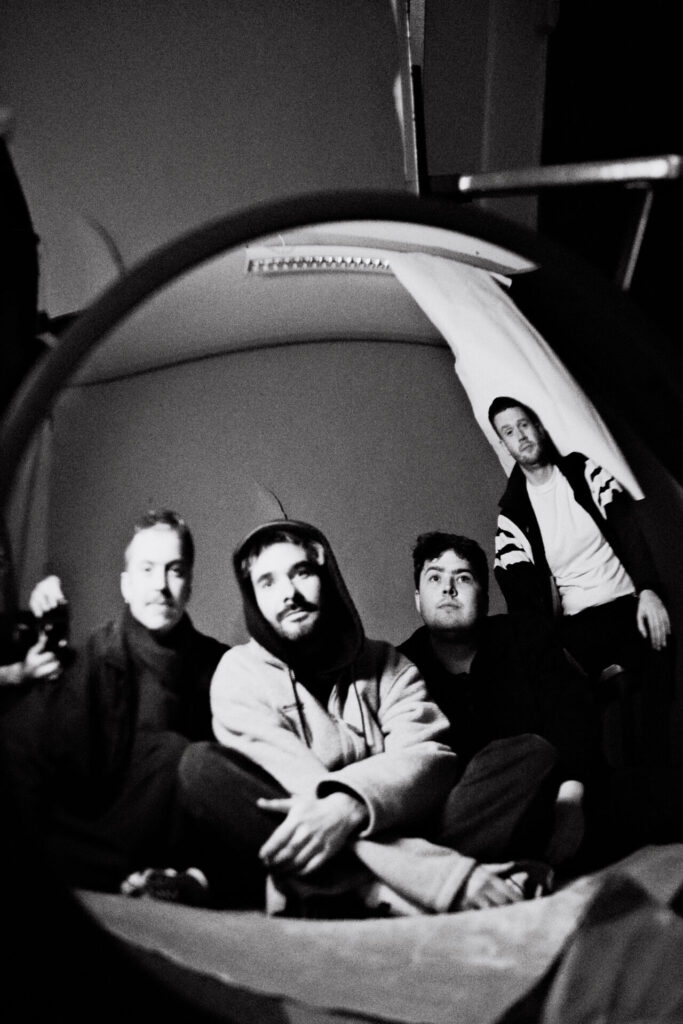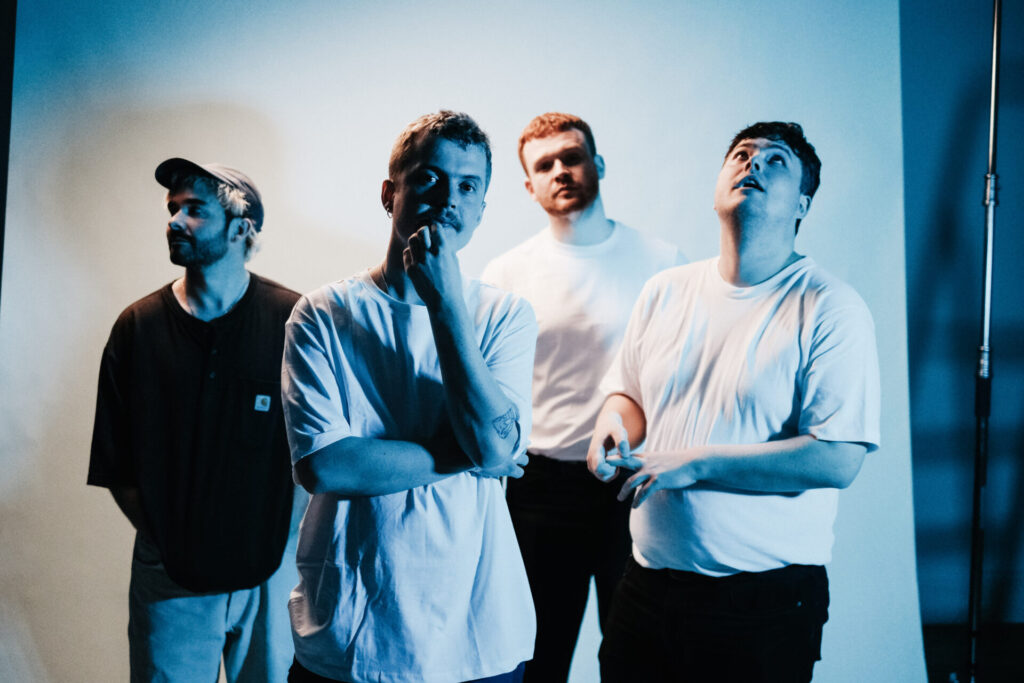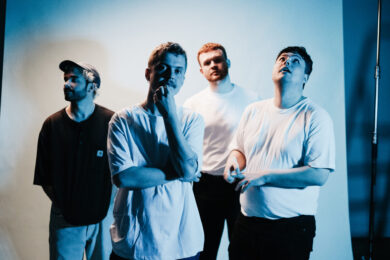Four years ago, God reclined smoothly into his cloudy throne, popped a grape in his heavenly mouth and unleashed the Covid pandemic with but a simple flick of his wrist. For some, this period still feels like a momentary glitch in time, a mad hallucination, but for Hull four-piece bdrmm the nightmare is enduring, and on their third album Microtonic, it remains completely inescapable.
“I think it’s something that we’re quite good at in our music, keeping this underlying sense of woe”, Jordan Smith, bdrmm’s bassist acknowledges, as the rest of the band burst out laughing. “I’m not trying to make something happy – I would be terrible for a Gap advert!”
Avid followers would have expected the band to once again be writing about dread and nihilism – but when they dropped lead single ‘John On The Ceiling’ just days ago, one couldn’t have expected just how unabashedly electronic their new music is. They first made their mark as faithful shoegaze disciples with their 2020 self-titled debut, but while 2023 follow-up I Don’t Know made small nods to dance music, such as the thumping techno kicks on ‘Alps’, Microtonic is a striking sonic leap. Here, the band paints their version of dystopia through jilted drum patterns and grainy synths instead of clanging guitar tones. It’s just one of many bold swings they take on the record: Working Men’s Club’s Syd Minsky-Seargeant makes a guest appearance on vocal duties for ‘Goit’ with his booming baritone, whilst ‘Snares’ sees some of frontman (and Jordan’s brother) Ryan Smith’s most commanding writing to date: “If we think about standing up / and taking back what’s ours. There’s only one more choice / that’s regardless of this moment / happening or not.”
bdrmm clearly have plenty of inspiration (“a fucking convicted felon’s just been made president of the United States… again”), and ‘Goit’ makes clear just how much ruin was left in the wake of the pandemic – “Distractions… spasms… terror… death. It all happened.” But, the record also suggests, the damage has now been done – and perhaps, rebuilding from the aftermath, peace isn’t quite as distant as it appears.

The turn to dance music, bdrmm say, is really a long overdue manifestation of their wider tastes. The band have all grown up around dance music as much as indie – Jordan and Ryan’s dad’s car record collection, for instance, saw Whatever People Say I Am, That’s What I’m Not, In Rainbows and Ministry Of Sound: Electro House Classics in equally regular rotation. “Our second record was us really trying to write this record,” says Ryan. “It was a lot of experimentation, but I think with this record we’ve managed to actually make the record that we’ve always wanted to make.”
Touring with Daniel Avery helped the band realise how they might take proper steps toward this newer direction. The DJ and producer has made it no secret how much he reveres shoegaze, even remixing Slowdive’s ‘kisses’ this year into an excellent take on atmospheric jungle – and it was his guidance that led bdrmm to start experimenting. “We supported him in December of 2022, and it was almost like a peek behind the curtain: this is an achievable thing that you can do,” Jordan explains. “Having Daniel there to show us that it’s not as hard as [it] maybe once was, that gave us the confidence to go in with album three – especially with Alex [Greaves] producing as well, he’s also got very similar influences to us, so it was something he was raring to go for from the get go.”
On previous records, bdrmm drowned their reflections on mental health with endless layers of echoes and guitars. Microtonic, however, saw the band “drawing it back, removing the reverb at the end and seeing how it could be a tune in itself and not just this mush of noise,” as Jordan observes.
If you listen to Microtonic, much of its music doesn’t sound nearly as tormented as a nightmarish pandemic record should. In fact, there’s a lot of instrumental beauty to lose yourself in, set against the intensity of its lyrics; the contemplative arpeggios in the title track, the acidic, dancefloor-ready melodies in ‘Clarkycat’ and Ryan’s soaring vocals on lead single ‘John On The Ceiling’, for instance. It was David Lynch’s Eraserhead, the singer says, which inspired this odd tonal juxtaposition: “That film is full of unease, but there is such beauty in it. The story is beautiful, but the way it goes about itself makes you feel uneasy, it really did something to me.” Microtonic, then, was written with plenty of “off-kilter moments: like you don’t really know what’s coming next, it can go from beauty to fucking dread.”
That approach is best demonstrated on ‘Infinity Peaking’, which was written at Ryan’s girlfriends’ house in Malaga whilst listening to Four Tet’s ‘Unspoken’. It was an unusually idyllic setting.“The first place I’d ever written a track that wasn’t in a dingy bedroom,” he laughs. “I was sat looking at the mountains in Malaga where the sun was shining. Like… what the fuck? I was in a really good place, but what came out obviously was quite the juxtaposition of being in such a beautiful environment but feeling these uncomfortable feelings.”
Perhaps it’s the openness and emotional safety that dance music afforded Ryan which allowed him to expose more of his vulnerabilities on Microtonic. Ryan’s written about his mental health struggles before on the last two records – in ways that were sometimes misinterpreted by listeners: “People thought ‘Be Careful’ was a political record, I was literally just talking about me nearly sniffing too much”. But there’s an unmistakable assuredness on Microtonic, one which sees Ryan not only adopt a more commanding tone throughout, but also a straightforward honesty about his mental health struggles: “Forgiving myself one more time, again,” he sings on ‘Infinity Peaking’. “Staring out at the world I have created. So lost, so lost…”
“The first two records were very much me talking about my mental health, but that’s completely masked [on those albums] by the amount of horror that seems to be going on in the world,” he says. “It’s inescapable because it just kind of goes into your head, so that’s the confidence to be able to talk about those more important, deeper values and the confidence within the songwriting.”
Lockdown split the band apart, as it did many. After spending days on end with each other, they found themselves living in different places, and the change in lifestyle was difficult to adjust to: “I think I can say for all of us that it impacted us in many different ways,” Jordan asserts.
When I ask Ryan what lockdown was like for him, he grimaces. “Fucking hell,” he begins. “Well, I was living in a basement in Leeds. I feel like a lot of people took that time to get sober, and I definitely went the opposite way. Being able to stay at home and do whatever you wanted to do – which was unfortunately for me, a lot of drugs and a lot of drink – I feel like I’ve come out of that a different person just because of the impact that’s had on me.
“I do feel like I come back to that lockdown quite a bit, but it’s just because it’s tattooed on my memory,” he continues. “I don’t think the world is the same – anxiety is fucking air now. It seems like it’s on edge. I don’t know if that’s just me because I’ve come out of this lockdown with a mental disorder or the world has shifted because everyone was in their own heads for two years.”
That paranoia has inspired the urgency palpable in Microtonic, whether in its lyrics or the stark sprechgesang Ryan adopts on tracks like ‘Snares’: “When you want to address something which is more or less the fucking nightmare world that we live in, you want to tell people that it’s alright. It’s fucking bleak, but within these little pockets of your own people, you can find that happiness within this bleakness.”
Really, that’s the most intriguing aspect about Microtonic. It might be slightly corny to say, but the record is imbued with an affirmation of friendship; of mates reconnecting through music after being separated by the pandemic. I bring up how much I enjoy the lyrical directness on ‘Snares’, and Jordan chimes in: “It’s interesting, because it’s one of the tunes where we’ve all listened to it and thought it was great, and then when we’ve talked to each other about what we liked about it, it’s completely different,” he says.
“I think Joe [Vickers, guitar] said when we were driving down to London at one point: ‘Oh, it’s great because the lyrics are all about us’. I’d never even considered something like that, and that’s the beauty of what Ryan’s speaking about in this record, that he’s managed to touch upon these various themes, but the record means something completely different to you than it probably means to us.
It was an invitation to Field Day 2023 (courtesy of Avery) which provided a moment of band bonding, which came at the same time they were rediscovering their love for dance music. “It felt like we’d been sealed in this bubble where nothing else outside mattered. [But at Field Day] you could just feel the love and respect that everyone had for each other. So I think it’s sort of like how everyone in life goes about going through these traumatic experiences by finding the love and the happiness where they can.”

“When you’re in a band, you don’t necessarily get the time to celebrate those little moments, because we spend so much time together – and we love spending time together, but it’s always to do with the band,” Vickers says of what was to be a the pivotal day, whilst Jordan adds: “I think we all found a lot of love and companionship in these new spaces that we were going to, like clubs and stuff.
Now, they’re invigorated to try even more new things out. Vickers says they’re reshaping their older songs to create a brand-new live show, explaining: “We’re so excited now with the idea of what we can perform live and completely redoing everything with a lot more synth and electronic elements and trying to work out how to play this album live. I sometimes think [if] I have to sit and watch another guitar band play a set of songs, that I actually might shoot myself in the head.
“That’s no disrespect to anyone at all,” he continues, “because we’ve loved being that band, but I think the excitement that we’re turning into something new…” Vickers scrambles for an appropriate simile. “Like a butterfly from a… chrysalis.” There’s immediate regret in his voice as he unconvincingly sticks the landing, but bdrmm just chuckle along good-naturedly.
bdrmm’s new album Microtonic is released on 28 February 2025 via Rock Action





